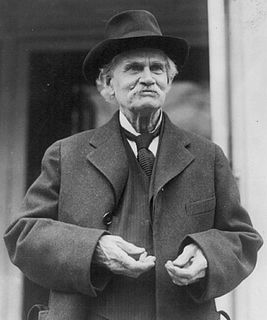A Quote by Matthew Lesko
Government workers often get a bad rap, but it's rare for them to receive much appreciation when government works.
Quote Topics
Related Quotes
There is a growing sentiment in America that regular saving should be ignored-that the government will take care of people and give them security when they get beyond a certain age or become old and unable to work, but it must be borne in mind that the people who earn and do save, take care of the government! Were it not for the thrifty and the willing workers, the government would be in a bad way.
The left wants you to believe that true morality is defined by how much money you give the government, how much money you pay the government, how much money the government gets from you, because only the government does good stuff, only the government does good works, only the government cares about people. It's bogus.
One of the reasons some of the advocates of ever larger government and more government intrusiveness get nervous about discussions of the actual cost of government is that they fear if the people had a discussion about what government costs, the true cost of taxes, that they might not want as much government as they are presently getting.
One of the tax systems in the US is for wage earners. The government takes money from them out of each paycheck - so it knows how much they make, and those workers can't cheat to any significant degree. But the other tax system is for capital. Those with capital get to tell the government what they want to tell. They may get audited, but if their tax returns are of any size the government doesn't have enough of the smart auditors to figure out what's really going on. And there are the rules that allow you to do things like take in money today and pay taxes on it thirty years from now.
People hired by government know who is their benefactor. People who lose their jobs or fail to get them because of the government program do not know that that is the source of their problem. The good effects are visible. The bad effects are invisible. The good effects generate votes. The bad effects generate discontent, which is as likely to be directed at private business as at the government.
Government is not a solution to our problem, government is the problem. ... Government does not solve problems; it subsidizes them. Government's view of the economy could be summed up in a few short phrases: If it moves, tax it. If it keeps moving, regulate it. If it stops moving, subsidize it. ... The problem is not that people are taxed too little, the problem is that government spends too much.


































